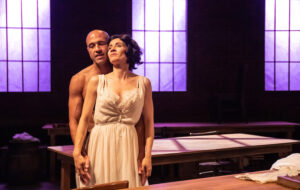
John Leguizamo in “Latin History for Morons.” Written and performed by Leguizamo and directed by Tony Taccone, “Latin History for Morons” is part of Center Theatre Group’s 2019-2020 season at the Ahmanson Theatre and will be presented September 5 through October 20, 2019. For more information, please visit CenterTheatreGroup.org. Press Contact: CTGMedia@CTGLA.org / (213) 972-7376. Photo by Matthew Murphy.


